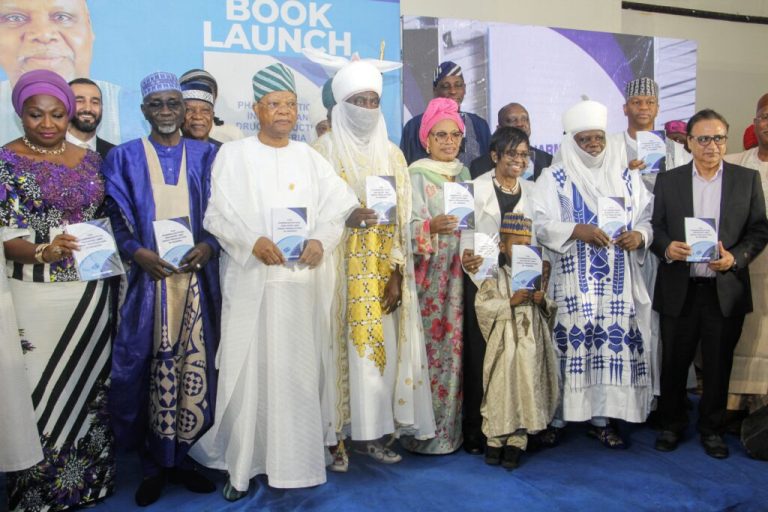-
Paved ways of fostering homegrown medicines
By Doris Obinna
Stakeholders in the pharmaceutical industry in Nigeria have highlighted ways to foster a vibrant drug manufacturing sector and the production of homegrown medicines for national and international consumption.
Speaking at the launch of the book titled “The Pharmaceutical Industry and Drug Production in Nigeria,” written by former President of the Pharmaceutical Society of Nigeria (PSN), Pharm. Ahmed Yakasai, former Minister of Health, Prince Julius Adelusi-Adeluyi, called on Nigerians to embrace industrialisation as necessary policies to overcome the country’s current challenges.
The book launch, which was held in Lagos over the weekend, addresses Nigeria’s drug manufacturing crisis and provides a roadmap for enhanced local production. It was attended by pharmaceutical stakeholders, government officials, regulatory agencies, the Emir of Kano, and other dignitaries from the health sector.
In his remarks, Adelusi-Adeluyi, who chaired the occasion, emphasised the urgent need for a shift towards self-sufficiency in drug manufacturing, adding that industrialisation is the only pathway to breaking free from the constraints of a third-world status.
Adelusi-Adeluyi commended the author for his perseverance in researching the Nigerian pharmaceutical industry’s history and highlighting data that charts a way forward for the sub-sector. He described the book as a vital tool to inspire pharmacists and policymakers to tackle the challenges of the pharmaceutical sector and champion local production.
In his welcome address, the author of the book, Yakasai, stated that the book is a monumental step toward advancing girl-child education. “The book launch is a high-profile event that targets N500 million, which will be dedicated to rehabilitating schools, improving infrastructure, and advancing education for girls in Kano State.”
Yakasai revealed that the journey of writing the book began following a challenge from the late Chief of Staff to President Muhammadu Buhari, Alhaji Abba Kyari, to develop a comprehensive strategy for boosting Nigeria’s pharmaceutical industry and achieving self-sufficiency in drug production.
According to him, his commitment to addressing the challenges in the sector led him to consult with key stakeholders, research global best practices, and present the findings during his time at the National Institute for Policy and Strategic Studies (NIPSS).
Calling on young pharmacists, industry leaders, and policymakers to join him in igniting a new era of innovation and growth in local drug manufacturing, Yakasai praised the Nigerian Sovereign Investment Authority’s recent plans to invest in the pharmaceutical sector, describing it as a step in the right direction.
On her part, the Director General of the National Agency for Food and Drug Administration and Control (NAFDAC), Prof. Moji Adeyeye, praised the author’s commitment to gathering accurate data for the book despite the challenges encountered during its writing and publication.
“I want to seize this opportunity to commend Alhaji Yakasai and his wife for taking the risk to write this book. Taking the time to write the book and making us all proud, he spent time gathering data and spent time publishing it,” she said.
Also, the Chief Executive of Business School Netherlands Nigeria, Prof. Lere Baale, said the book delves into Nigeria’s reliance on imported drugs and proposes solutions to promote local manufacturing. “The book provides a comprehensive historical background of Nigeria’s pharmaceutical industry, tracing its development from colonial times to the present.”
He pointed out the book’s core theme of transitioning from dependence on imported drugs to local manufacturing, emphasising the necessity for Nigeria to enhance its drug production capabilities.
Former Kano State Governor, Sen. Ibrahim Shekarau, described Yakasai as an accomplished pharmacist whose book captures most of the problems facing the profession and appeals to the government and policymakers to consider implementing some of the book’s recommendations.
In attendance were: CEO of Katchey Company Limited, Dr. Kate Isa; the High Commissioner of Pakistan to Nigeria, Major General Sohail Ahmad Khan (Rtd); and representatives of the National Institute for Policy and Strategic Studies, among others.
